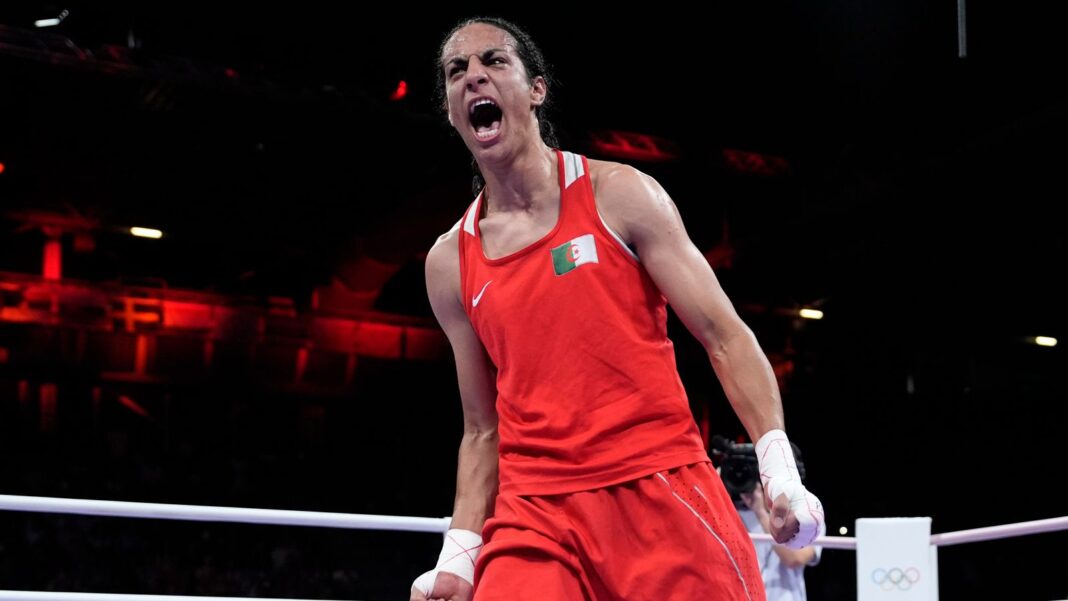Boxer Imane Khelif has said winning an Olympic gold medal would be the “best response” to the wave of scrutiny she has faced over misconceptions about her gender.
The 25-year-old Algerian is set to fight in the women’s 66kg semi-finals on Tuesday where she will take home a medal even if she loses.
But her success has been overshadowed by online abuse based on false claims she is a transgender woman and discourse over the dangers of high testosterone levels in women’s sports.
Her quarter-final win last week came as the head of the International Boxing Association (IBA) defended its decision to ban Khelif and fellow boxer Yu-ting – who is also competing for Olympic gold – from last year’s world championships for failing to meet gender eligibility criteria.
Please use Chrome browser for a more accessible video player
2:43
Algerian boxer guaranteed a medal
The IBA has a troubled history and has been banned by the International Olympic Committee (IOC) over governance issues, alleged corruption and ties to Russia.
Speaking to SNTV, a sports video partner of The Associated Press, Khelif said: “I send a message to all the people of the world to uphold the Olympic principles and the Olympic Charter, to refrain from bullying all athletes, because this has effects, massive effects.
“It can destroy people, it can kill people’s thoughts, spirit and mind. It can divide people. And because of that, I ask them to refrain from bullying.”

Khelif will fight in her semi-final bout on Tuesday. Pic: AP
Khelif said she was in contact with her family twice a week and she hoped “they weren’t affected deeply” by the scrutiny she has faced.
“They are worried about me,” she added.
“God willing, this crisis will culminate in a gold medal, and that would be the best response.”
Please use Chrome browser for a more accessible video player

0:22
Boxer’s father: ‘My child is a girl’
Khelif expressed gratitude to the IOC, whose support she said “has done me justice” and showed “the truth”.
The Algerian’s victory over Angela Carini last week sparked controversy after the Italian boxer abandoned the fight after just 46 seconds.
Carini later said she regretted her decision and wished to apologise to Khelif.

Khelif consoled Italy’s Angela Carini at the end of their bout. Pic: AP
High-profile figures including Donald Trump, Elon Musk and JK Rowling have stoked conversation about Khelif’s gender, but the boxer said she had mainly managed to avoid seeing online discourse.
“Honestly, I don’t follow social media,” she said. “There is a mental health team that doesn’t let us follow social media, especially in the Olympic Games, whether me or other athletes. I’m here to compete and get a good result.”
After beating Hungarian boxer Anna Luca Hamori in the quarter-finals, Khelif went to the centre of the ring, waved to her fans, knelt and slammed her palm on the canvas, with her smile turning to tears.
“I couldn’t control my nerves,” she said.
“Because after the media frenzy and after the victory, there was a mix of joy and at the same time, I was greatly affected, because honestly, it wasn’t an easy thing to go through at all. It was something that harms human dignity.”
Read more:
Olympics ‘destroying women’s sports’
Calls for sex testing at Olympics
Khelif had competed in IBA events for several years without problems until she was abruptly suspended from last year’s world championships.
The Russian-dominated body – which has faced years of clashes with the IOC – has refused to provide any information about the tests.
Khelif’s next fight in Paris is against Thai boxer Janjaem Suwannapheng. If she wins again, the Algerian will fight for a gold medal on Friday.







